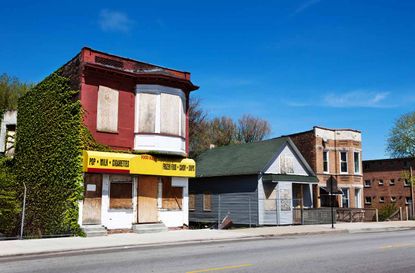Opportunity Zones: Tax Panacea or High-Risk Money Pit?
The IRS has given savvy real estate investors an intriguing chance to help develop low-income areas without potentially paying any taxes whatsoever on their gains along the way. But it's not for the fainthearted.


The first time I heard the term “opportunity zone” was in October 2018 while playing golf with a CPA friend of mine. He described to me the scant details known at the time about Section 1400Z of the Internal Revenue Code.
It appeared, according to my friend, that there was a special new rule that allowed capital gain taxes to be delayed or even avoided if they were reinvested in specific geographic zones designated by the governor of each state. I was certainly intrigued by this and spent the next few days poring through internet articles and commentary on this new investment opportunity, which could present significant benefits for my clients.
I was disappointed at the time to find that little was known about how opportunity zone investments would work. It seemed there were more questions than answers; however, the Internal Revenue Service issued its first set of guidelines later that month (October 2018), and provided further guidance in a second set of guidelines released in mid-April 2019.

Sign up for Kiplinger’s Free E-Newsletters
Profit and prosper with the best of expert advice on investing, taxes, retirement, personal finance and more - straight to your e-mail.
Profit and prosper with the best of expert advice - straight to your e-mail.
The Basics of Opportunity Zones
At this point, you’re likely asking the same questions I did: What is an opportunity zone, and might it be an investment that I should consider as part of my portfolio?
Section 1400Z-2 of title 26 IRC gives us the very technical answer to this question. You can read the text here.
The simplest description is that opportunity zone investments provide for a deferral or elimination of capital gains tax on realized capital gains that are reinvested, long-term, in low-income census tracts that each state has designated as economically disadvantaged and in need of redevelopment.
An Example of How It Could Work
For example, if you have $1 million in realized capital gains in 2019 and invest this amount in an opportunity zone project or fund, you will pay no capital gains tax on this amount in 2019. Initially, your basis in the new investment will be zero. If the investment if held for five years, basis is assigned to the investment of 10% of the investment ($100,000). If held for seven years, an additional 5% is assigned to the basis ($50,000). Capital gain tax is due as of Dec. 31, 2026, on the initial amount invested into the fund, or $850,000 ($1 million minus the basis allocation of $150,000). The initial deferral can only reach the seven-year hurdle if the investment is made before the end of 2019. If the asset or fund is held for 10 years, the basis of the property is determined to be the sales price of the project, and no capital gains taxes are due on the sale.
This means that if the initial investment of $1 million grows to $6 million when the project is sold after 10 years, no capital gains taxes will be due on the sale. You can imagine that even in the absence of concrete details or the criteria for a safe harbor being established, there was a significant amount of excitement around the possibility of investing in an opportunity zone — especially as stock prices continued to soar and unrealized gains were piling up.
Some Downsides
So, what’s the problem?
First, there is a lot of money chasing very few shovel-ready deals. Getting 2019 gains deployed into a stand-alone deal might be tricky. This reality makes Qualified Opportunity Zone Funds (QOF) attractive, since the funds have 30 months to deploy the capital, but investors get credit for making the investment in 2019.
Second, there can be a high degree of risk involved. The risk associated with selecting the right investment partner or fund in which to place your investment is likely just as high as the intended project. This risk is twofold: The investment partner must 1) understand the complex rules associated with a qualified opportunity zone investment and 2) have the ability to comply with the rules required to operate a viable QOF.
There is a reason that these areas remain economically disadvantaged and that real estate investors and developers have not already started redeveloping these areas. Simply, developers do not believe they can make a return that justifies undertaking the project.
There are more than 8,000 opportunity zones designated across the 50 U.S. states, into which $234 billion has been invested over the past five years. It remains to be seen if the deferral or elimination of capital gains taxes is a sufficient driver to make these areas and projects even more attractive to developers and investors in order to get more of these projects off the ground.
Some Questions to Consider
For most investors who can handle the risk profile of a private equity investment and have significant realized (or even unrealized) gains that could be harvested in 2019, the investment in a QOF could be a good addition to a diversified portfolio. But be sure to ask the promoter of a QOF or the developer of the tract a lot of questions before investing. Examples of some key questions would be to determine how much leverage will be used to fund the deal and if a distribution to partners is planned in early 2027 to cover the tax that will be due on the amount of capital gain placed into the investment. It is also important to gauge the savvy of the investment partner who will be handling the management of the QOF, as well as, their track record in selecting and completing private equity real estate deals in the past.
Another key question to ask is how the developer or fund manager plans to satisfy the “substantial improvement” requirement set forth in the code. If the proposed investment is to redevelop an existing building, the code requires that the developer or fund manager put at least as much capital into the redevelopment of the building as the building is worth when the property is purchased. For example, if the fund purchased a piece of land and empty office building for $1 million and the building is determined to be worth $600,000, then the developer must invest at least $600,000 into the project within 30 months of the acquisition date to qualify for benefits under the Opportunity Zone tax law.
Time Is Quickly Running Out
It is worth noting that the clock is ticking, and the Dec. 31, 2026, date to end the deferral period on the initial investment is a hard and fast date contained in the code. So, if an investment in a QOF is not made before Dec. 31, 2019, the investor cannot realize the additional 5% increase in the basis and will be limited to the 10% allowed for investments held longer than five years, since it would not be possible to hold the investment for seven years before the 2026 cutoff date.
If you believe a QOF investment could be right for you, speak to your investment and tax adviser to be sure you understand the benefits and risks associated with this type of investment. I believe the government has set a good goal of using tax savings to spur private investors to create jobs and growth in disadvantaged areas of our country. Only time will tell if opportunity zones are the best way to accomplish this goal.

To continue reading this article
please register for free
This is different from signing in to your print subscription
Why am I seeing this? Find out more here

David E. Redding, Market President and Senior Wealth Advisor at Argent Trust Company, helps clients navigate the complex world of estate planning, trust administration, wealth transfer and closely held business strategies. His 30 years of experience in the industry give him a depth and understanding to tackle real life problems faced by high net worth families as they plan for the transition of business interests and wealth to future generations.
-
 Stock Market Today: Nasdaq Soars Ahead of Tesla Earnings
Stock Market Today: Nasdaq Soars Ahead of Tesla EarningsThe EV stock rose nearly 2% ahead of its highly anticipated Q1 earnings report, due after tonight's close.
By Karee Venema Published
-
 GM Stock Accelerates After Earnings Beat
GM Stock Accelerates After Earnings BeatGeneral Motors beat expectations for the first quarter and raised its outlook for the year. Here's what you need to know.
By Joey Solitro Published
-
 Four Tips to Make Your Sales Presentation a Winner
Four Tips to Make Your Sales Presentation a WinnerBeing prepared and not being boring can go a long way toward persuading a potential customer to buy into what you’re offering.
By H. Dennis Beaver, Esq. Published
-
 Pros and Cons of Waiting Until 70 to Claim Social Security
Pros and Cons of Waiting Until 70 to Claim Social SecurityWaiting until 70 to file for Social Security benefits comes with a higher check, but there could be financial consequences to consider for you and your family.
By Patrick M. Simasko, J.D. Published
-
 Now Could Be Time for Private Investors to Make Their Mark
Now Could Be Time for Private Investors to Make Their MarkThe venture capital crunch may be easing, but it isn't over yet. That means there could be direct investment opportunities for private deal investors.
By Thomas Ruggie, ChFC®, CFP® Published
-
 How to Stop Boredom From Ruining Your Happy Retirement
How to Stop Boredom From Ruining Your Happy RetirementRetirees who explore new interests and have an active social life are more likely to find joy — and even greatness — in the newfound freedom of retirement.
By Richard P. Himmer, PhD Published
-
 The Life-or-Death Answers We Owe Our Loved Ones
The Life-or-Death Answers We Owe Our Loved OnesHow our life ends isn’t always up to us, but that question too often must be answered by loved ones and health care workers who don’t know what we would want.
By Joel Theisen, RN Published
-
 Hot Tips for Home Buyers and Sellers Right Now
Hot Tips for Home Buyers and Sellers Right NowReal estate looks to be especially hopping this spring, thanks to pent-up demand and buyers adjusting to higher mortgage rates. Here’s how you can prepare.
By Pam Krueger Published
-
 Is 100 the New 70?
Is 100 the New 70?Eating well, exercising, getting plenty of sleep and managing chronic stress can help make you a SuperAger. Funding that long life requires longevity literacy.
By Phil Wright, Certified Fund Specialist Published
-
 Nine Lessons to Be Learned From the Hilton Family Trust Contest
Nine Lessons to Be Learned From the Hilton Family Trust ContestDisclaimers, good communication, post-marital agreements and more could help avoid conflict in a family after the owners of a wealthy estate pass away.
By John M. Goralka Published